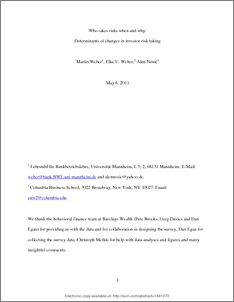|
Who takes risks when and why: determinants of changes in investor risk taking
Weber, Martin
;
Weber, Elke U.
;
Nosic, Alen
![[img]](https://madoc.bib.uni-mannheim.de/style/images/fileicons/application_pdf.png)  Vorschau |
|
PDF
SSRN-id1441273_WP167.pdf
- Veröffentlichte Version
Download (684kB)
|
|
URL:
|
https://ub-madoc.bib.uni-mannheim.de/31437
|
|
Weitere URL:
|
http://dx.doi.org/10.2139/ssrn.1441273
|
|
URN:
|
urn:nbn:de:bsz:180-madoc-314379
|
|
Dokumenttyp:
|
Arbeitspapier
|
|
Erscheinungsjahr:
|
2011
|
|
Titel einer Zeitschrift oder einer Reihe:
|
Working Paper / Lehrstuhl für Finanzierung, Universität Mannheim
|
|
Band/Volume:
|
167
|
|
Ort der Veröffentlichung:
|
Mannheim
|
|
Auflage:
|
Version 2011
|
|
Sprache der Veröffentlichung:
|
Englisch
|
|
Einrichtung:
|
Fakultät für Betriebswirtschaftslehre > ABWL u. Finanzwirtschaft, insbes. Bankbetriebslehre (Weber 1993-2017)
|
|
MADOC-Schriftenreihe:
|
Lehrstuhl für ABWL, Finanzwirtschaft, insb. Bankbetriebslehre (Weber) > Working Papers
|
|
Fachgebiet:
|
330 Wirtschaft
|
|
Fachklassifikation:
|
JEL:
G1,
|
|
Freie Schlagwörter (Englisch):
|
overconfidence , risk attitude , risk perception , return perception , risk taking , extended domain specificity
|
|
Abstract:
|
We use data from a repeated survey panel that was run with real online broker customers in September 2008, December 2008, and March 2009. In all three surveys subjects' risk attitudes, risk expectations, return expectations, and risk taking behavior, i.e. the proportion of wealth they are willing to invest into the stock market compared to a risk free asset, were elicited. Using this unique dataset we analyze whether risk taking, risk attitudes, and expectations change from one quarter to the other and whether the latter two have an impact on risk taking behavior. Our results indicate that risk taking behavior decreases substantially from September to December and from December to March. Similarly, risk expectations and return expectations also change substantially from one survey to the next one. In contrast, various measures of risk attitudes are fairly stable over the time periods. Interestingly, observed changes in risk taking behavior can primarily be attributed to changes in risk and return expectations but not to changes in past performance or changes in risk attitudes. Moreover, our findings are valuable for practitioners - who are urged by MiFID (2006) to elicit their customers' risk profiles and risk preferences - since we show that risk attitudes remain fairly stable and that changes in investment behavior can mainly be attributed to changes in expectations. Lastly, we illustrate that overconfidence seems to be a fairly stable construct between September and December and tends to decrease slightly from December to March.
|
 | Dieser Eintrag ist Teil der Universitätsbibliographie. |
 | Das Dokument wird vom Publikationsserver der Universitätsbibliothek Mannheim bereitgestellt. |
Verfügbare Versionen dieses Eintrags
-
Who takes risks when and why: determinants of changes in investor risk taking. (deposited 18 Jul 2012 06:15)
[gerade ausgewählt]
 Suche Autoren in Suche Autoren in
Sie haben einen Fehler gefunden? Teilen Sie uns Ihren Korrekturwunsch bitte hier mit: E-Mail
Actions (login required)
 |
Eintrag anzeigen |
|
|




 Suche Autoren in
Suche Autoren in